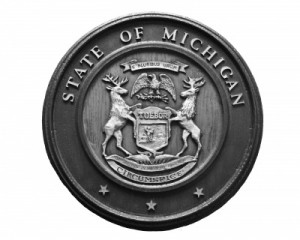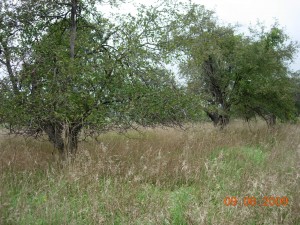 On Thursday 17 September 2009, in the Michigan House of Representatives, Robert Jones’s House Bill 5207 was read a second time, placed on third reading, placed on immediate passage, read a third time, passed and given immediate effect (Yeas 105 Nays 2), title amended, and transmitted to the Senate. It all happened fast, though perhaps not as fast as its supporters in the Western Michigan University administration and board have been hoping. Its passage by the House was recorded in the Kalamazoo Gazette.
On Thursday 17 September 2009, in the Michigan House of Representatives, Robert Jones’s House Bill 5207 was read a second time, placed on third reading, placed on immediate passage, read a third time, passed and given immediate effect (Yeas 105 Nays 2), title amended, and transmitted to the Senate. It all happened fast, though perhaps not as fast as its supporters in the Western Michigan University administration and board have been hoping. Its passage by the House was recorded in the Kalamazoo Gazette.
In the Senate on Monday 21 September, the bill was assigned to the Appropriations Committee. This committee consists of Senators Jelinek (C), Pappageorge (VC), Hardiman, Kahn, Cropsey, Garcia, George, Jansen, Brown, McManus, Stamas, Switalski (MVC), Anderson, Barcia, Brater, Cherry, Clark-Coleman, and Scott. Of these, the most important for the future of the Colony Farm Orchard is Senator Tom George.
Everyone who believes that the Colony Farm Orchard should remain as dedicated open space might want to contact Senator George and ask him to make it so. His email address is sentgeorge@senate.michigan.gov
Following is a letter I sent to Senator George last night.
Dear Senator George–
What happens to the Colony Farm Orchard is now in your hands. Since the land is in your district, colleagues in the Senate will follow your lead. If the Senate votes not to remove the restriction placed on it when it was conveyed to WMU in 1977, the land will stay open space as was intended.
Removing the restriction (Western Michigan University may utilize the property solely for public park, recreation, or open space purposes, except that the legislature, by statute, may authorize Western Michigan University to utilize the property for some other public purpose) would be needed to convert Colony Farm Orchard (henceforth, the CFO) from dedicated open space into a new section of the so-called BTR Park.
The situation is an almost exact rerun of the attempt by WMU in 1990 to convert the CFO into phase 1 of a research and business park. The Asylum Lake Preservation Association was founded soon afterwards, and a lengthy battle between WMU and the majority of the citizens of the region began. The conflict came to a head in spring 1993 when the House passed a bill adding “or a business, technology, and research park” to the list of allowed uses for the CFO.
The bill went to the Senate Committee on State Affairs in April 1993. Prolonged, caustic discussion showed that the Committee understood what the intent of the legislature had been in the original conveyance and also showed that the members did not consider the BTR park a public purpose. On April 22, 1993, the Committee adjourned without action, but it was clear that, if a vote were to be taken, the new language would be rejected. President Diether Haenicke realized that the battle was over and pulled the plug on the whole development proposal on May 3, 1993.
Eventually, a BTR park was built on the University Farm, which had been given to WMU without restrictions in 1959. The Asylum Lake property, conveyed to WMU with restrictions identical to the CFO, was set aside as the Asylum Lake Preserve.
One major reason why the bill coming to the Senate in 2009 should be defeated is the damage it does to the idea–and ideal–of land conservation. When government bodies set aside land for open space, the citizens and the local governments should be able to count on it. They make later decisions with that status as a given; it should only be altered out of critical necessity.
There are also many specific arguments why this particular land should be left pretty much as is and not sold off for commercial development.

Apple trees at the Colony Farm Orchard. Photo by Richard Brewer
1. The land functions as part of the adjacent Asylum Lake Preserve. Its wooded areas, thickets, grasslands, and wetlands enlarge the sanctuary, making the whole more diverse and more stable, in accordance with well-accepted conservation biology principles.
2. The CFO should be saved for its own sake, for its historic significance as part of the tall-grass Genesee Prairie and the Colony Farm experiment itself. It is also of value for the wildlife species that live more safely here than at the heavily visited Asylum Lake Preserve. It is a high quality migratory stopover site for birds. Also the vegetation and soil is steadily sequestering carbon. Most of this stored carbon would be returned to the atmosphere as carbon dioxide if the development proceeds.
3. There are numerous reasons why the CFO is not well suited for business park expansion: It’s small, allowing only a few lots. WMU will spend up to $985,000 to buy out a Michigan State University entomology lease. The old orchard occupying one third of the site will require expensive remediation because of the lead and arsenic build-up from insecticide use from the late 1800s to 1947.
4. There are many other sites equally or better suited for the expansion. Some are held by private owners, but WMU owns suitable lands that are nearby and have no title restrictions.
5. The orchard was bought by the state long ago with taxpayer money. Clearly a major motive for the proposed conversion is to convert State of Michigan assets into WMU dollars. The CFO is, in a way, an innocent by-stander.
This is the short list of arguments. You might suppose that WMU has an equivalent list of rebuttals, but that is not the case. No one in the administration or board has been willing to engage in debate on the merits. President John Dunn has never, to my knowledge, made any public comment on the issue. Nearly all statements about the project have come from one Vice President and questions have been met, not with answers, but with marketing rhetoric about what a great success the already built part of the BTR park has been.
I hope that you and your senatorial colleagues in 2009 will be as wise as the Senate of 1993.
Sincerely yours
Pingback: Is this the Last Go Round for the Colony Farm Orchard? | Richard Brewer
Pingback: The Colony Farm Orchard is Not Trade Land | Richard Brewer
Pingback: A good time was had by all at the Save the Colony Farm Orchard Rally | Richard Brewer
Pingback: Conservation Values of the Colony Farm Orchard, Kalamazoo County, Michigan | Richard Brewer